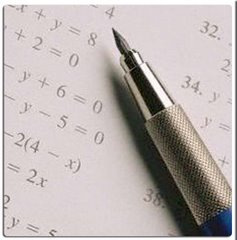An odd number added to itself an odd number of times yields
(A) an odd number
(B) an even number
(C) a prime number
(D) a positive number
(E) a perfect square
Wednesday, April 25, 2007
Subscribe to:
Post Comments (Atom)
is intended to be a spot where any student preparing for GRE can discuss study topics,find or provide tips & works towards a top score along with other students working for the same goal.Answer"GRE WORD OF THE DAY", "GRE SENTENCE COMPLETION OF THE DAY", "GRE ANALOGY OF THE DAY", "GRE ANTONYM OF THE DAY", "GRE MATH PROBLEM OF THE DAY", "GRE ALGEBRA QUESTION OF THE DAY", "GRE GEOMETRY QUESTION OF THE DAY"& "GRE PASSAGE OF THE WEEK". To get a top score,the first step of the ladder starts from here.

3 comments:
a
A
Since pq/2 is prime, it is an integer. Hence, either p or q must be even; otherwise, the 2 would not
cancel and pq/2 would be a fraction. The only even prime number is 2. Hence, either p or q, but not both,
must be 2. The other one is an odd prime number. Now, the sum of an even number and an odd number is
an odd number. The answer is (A).
Post a Comment